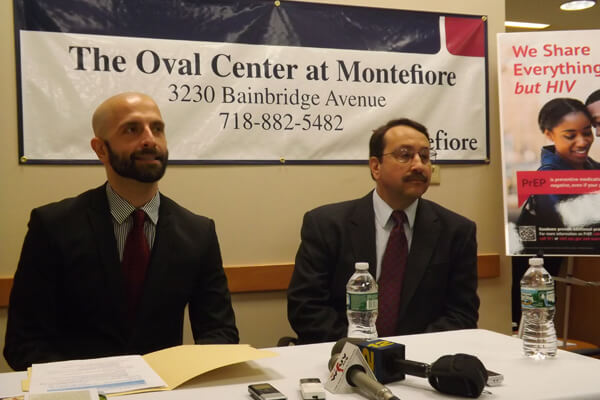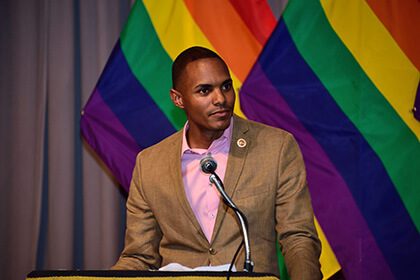New York State’s highest court has ruled that a trial judge appropriately granted a defendant’s motion to reduce charges against him from felony to misdemeanor reckless endangerment in a case where the defendant apparently transmitted HIV to another man through unprotected anal sex without disclosing his HIV status, reassuring his partner that it was “okay.”
The 4-1 decision by the Court of Appeals, issued on February 19, involved the decision by Onondaga Supreme Court Justice John J. Brunetti in Syracuse to grant the motion by defendant Terrance Williams in a case dating to 2010. Williams also faces a misdemeanor assault charge.
The high court concluded that evidence presented to the grand jury would not support the contention that the defendant acted with “depraved indifference to human life.”
New York Court of Appeals finds “depraved indifference to human life” prosecution cannot be sustained
According to the Court of Appeals opinion, Williams and the other man became friends in July 2010, and later engaged in anal sex, the first several times with condoms and later without. The unprotected intercourse began, the court wrote, when “the victim reached for a condom only to have defendant take the condom away from him,” assuring him it was “safe for them to have unprotected sex.” The men had previously talked several times about HIV and “the need to be careful to avoid infection.”
In October 2010, Williams told his partner that Williams might be HIV-positive because a prior sexual partner with whom he had unprotected sex had been diagnosed. Williams urged his partner to get tested and their relationship soon ended. In February 2011, the victim experienced symptoms, got tested, and turned out to be infected.
In April 2011, Williams, writing to the other man on social media, confessed he had been diagnosed as HIV-positive before they started having sex and expressed remorse about having lied to him.
“I want to start by saying that I sincerely apologize for giving you HIV,” he wrote. “I made my biggest mistake that night I said I didn’t want to use a condom knowing my status but still being so deep in love with you that I wanted us to be one person. I was selfish and I was more so concerned with my own false happiness than your health.”
The victim contacted the police, and the Onondaga County district attorney presented the case to a grand jury, which voted to indict Williams on charges of reckless endangerment in the first degree and third-degree assault. The reckless endangerment charge, a felony subjecting a defendant to a potential prison term of up to seven years, requires a finding that the defendant “under circumstances evincing a depraved indifference to human life… recklessly engages in conduct which creates a grave risk of death to another person.” The assault charge, a misdemeanor with a maximum prison sentence of one year, involves a defendant intentionally, recklessly, or negligently causing physical injury.
In a pretrial motion, Williams argued his conduct did not show depraved indifference to human life and, in light of current medical treatments, did not subject the victim to a “grave risk of death.” Justice Brunetti granted the motion and reduced the charge to second-degree reckless endangerment, a misdemeanor that involves a defendant “recklessly engag[ing] in conduct which creates a substantial risk of serious physical injury to another person.” The maximum sentence for this is one year.
The district attorney appealed Brunetti’s ruling, but the Appellate Division, Fourth Department, affirmed the trial judge in a 5-0 vote. The panel, finding the evidence would not support a charge based on depraved indifference to human life, focused on Williams’ fear that the other man would reject his love, his later urging the victim to get tested, and his eventual apology.
“The fact that defendant encouraged the victim to be tested for HIV indicates that defendant was trying, however weakly and ineffectively, to prevent any grave risk that might result from his conduct,” the Appellate Division panel wrote. “We thus conclude that, while the evidence certainly shows that defendant cared much too little about [the victim]’s safety, it cannot support a finding that he did not care at all.” The panel also found that medical evidence presented to the grand jury countered the conclusion that transmitting HIV today puts somebody at grave risk of death.
The Onondaga prosecutor then appealed to the state’s highest bench, which abstained from deciding whether HIV infection today creates a grave risk of death, instead focusing on the depraved indifference issue.
“There is no evidence that defendant exposed the victim to the risk of HIV infection out of any malevolent desire for the victim to contract the virus, or that he was utterly indifferent to the victim’s fate,” the court wrote. “Without a doubt, defendant’s conduct was reckless, selfish, and reprehensible. Under our case law, thought, this is not enough to make out a prima facie case of depraved indifference.”
Judge Eugene Pigott, Jr., dissented, contending that a felony charge could be sustained. Given that Williams was aware of his HIV status, failed to inform the other man, and then took the condom away from him despite knowing of his concern about infection, “at the very least… defendant acted with ‘wanton cruelty, brutality, or callousness’ and ‘utter indifference’ to the victim’s fate.”
Williams’ subsequent remorse was irrelevant, Pigott concluded; his state of mind at the time of the unprotected sex was the relevant consideration. The court should not substitute its judgment for that of the grand jury, which, he noted, received conflicting evidence on the “grave risk of death issue,” which in his view was “legally sufficient” to establish that such risk exists.
The Court of Appeals’ action means the district attorney can proceed with the reduced charge of second-degree reckless endangerment as well as the original third-degree assault charge. Unless Williams contests the prosecution’s factual case, it’s likely the two sides will seek a plea bargain. Given District Attorney William J. Fitzpatrick’s obvious commitment to pursuing this matter, however, it's unlikely he would offer Williams any deal that doesn’t involve prison time.































